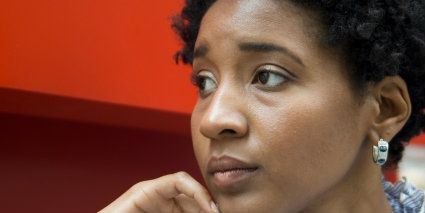My Not Black Enough Story

The U.S. Census has a handful of race categories for us to box ourselves in. I’m a brown-skinned girl with a head full of unruly kinky hair, so it only made sense for me and my afro pick to stand right beside my other Black or African Americans.
However, over the years I realized that what made sense for me did not necessarily make sense for others.
Now my young naïve self took this as a compliment, perhaps as a term of endearment. Who wouldn’t want to be likened to America’s favorite cookie? My excitement about what I thought was me fitting in was short lived when I was finally filled in by a fellow camper about what an Oreo really is.
“They called you a what? You don’t know what an Oreo is? Oh… Well, it’s a black person who’s white on the inside.”
Let’s just say I didn’t eat Oreos for a long time.
My life after that fateful summer seemed to be an ongoing test, considering that years later I’m still dealing with the challenge of having to prove my blackness.
It’s even had an effect on several aspects of my life, including dating.
My freshman year of college I had a boyfriend by the name of Jamal. One night we were on the phone blabbing away like young couples in puppy love do, when our nauseatingly lovey-dovey talk was rudely interrupted by an observation he just had to share.
“T, don’t take this the wrong way, but you talk like a white girl,” Jamal said.
“What? Huh? You’re kidding me right?” I replied confusingly.
“Yeah, my friends overheard us on the phone and thought I was with a white woman,” Jamal answered.
I sound like a white girl? What, in the name of Al Sharpton’s hairdresser did that mean?
I didn’t quite understand it. Was there some sort of litmus test that I had to pass in order to prove my blackness? I was starting to believe that there was a National Black or African American Convention that I kept missing.
My parents are black. I’m black. I even felt black, if that made any sense.
My dad grew up in The Bronx and my mom grew up in Harlem. After love, marriage, and a baby carriage they decided they didn’t want their three daughters to grow up in New York City. Though the bright lights of the city glimmer to tourists, they are often dim to minorities, particularly to many African Americans. With underfunded and underperforming public schools, not the most pleasant of neighborhoods, and the undercurrent of racial discrimination, my parents chose Westchester County, New York to raise us.
My father especially wanted us to be proud of our race but not for it to define us. And that desire played out with car trips along the east coast with Johnny Cash and James Taylor blasting through the speakers; dinners at sushi joints; Broadway musicals; and a variety of ethnically and culturally diverse friends.
So how did this translate into an abandonment of my blackness? Like the amount of licks it takes to get to the center of a Tootsie roll pop, the world may never know.
What I do know is although I may not fit the stereotype of what VH1 reality shows consider being black, it doesn’t mean my skin is devoid of melanin.
I may be considered a speaker of the “valley girl dialect” or a “Huxtable kind of black” for the rest of my life, but I’ve realized a few things. I take pride in showing others that black isn’t what you see on an episode of Basketball Wives, in a rap video, or on the eleven o’clock news.
Black is a box among other boxes labeled White, American Indian or Alaska Native, Asian, and Native Hawaiian or Other Pacific Islander. Boxes we’re told to categorize ourselves in, so that we know how to walk, talk, dress, act and even eat. But the .1% of our DNA that determines our race does not define me. This Black or African American will define herself.
Related:
I Love Your Hair: Letting Go of Kinky Hair AnxietyFinding The Beauty in Baby Steps
How I Learned to Accept the Love I Knew I Deserved
I'm just a 21 year old college student with a head full of kinky hair and dreams that can't be confined to a basic 9 to 5. Follow my musing, misadventures and merriment on www.TaraPook.com.

No comments: